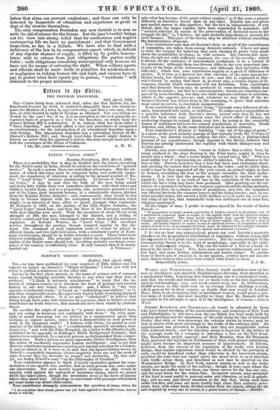Womnsr Ann WATCEIVOEK. —Mrs. Grundy would doubtless turn up her
nose at intelligent and educated Englishwomen directing their attention to a mechanical trade, forgetting that shirtmaking also is a mechanical trade, and that the needle and thimble are as much tools as the fine implements used in watchmaking ; nay, and much coarser tools, too. In Switzerland, 20,000 women in this trade earn on an average fifteen shillings a-week, which goes as far in their country as double that sum would in London. Here, then, is an occupation that, to intelligent women' would prove a per- feet mine of wealth, and most heartily we trust that Mr. Bennett will be successful in his attempts to open it to the intelligence of women.—Once a Week.
STREET RArLwavs AND TRAKWAYS.—It would be admitted by those who have heard anything of the street-railways and tramways of New York and Philadelphia, or who have seen the use which has been made both by railway carriages and the omnibuses, of the rails along the line of Liverpool Docks, that rails or iron-tramways for vehicles drawn by horses, may be laid in streets with great advantage to the traffic of the ordinary kind. An apprehension has prevailed in London that they are inapplicable unless with widened streets ; and the objection seems to have led to the failure of the attempt made by a company to introduce a line on the New Road. The Marylebone people opposed ; and their Member, then Sir Benjamin Hall procured the rejection in Parliament of what with proper restrictions might have become an important measure of improvement. It follows, however, from the success of the regulation of the traffic over London Bridge, that similar regulation which would be effected by the provision of rails, would be beneficial rather than otherwise in the narrowest streets, provided the rails were not raised above the street level so as to interfere with traffic across them, and beneficial as now may be observed on the Westminster Bridge. In New York, narrow streets, as well as the wider streets, are made the route of the railway ; though in some eases where the width does not suffice for two lines, one street serves for the line one way, and the next street for the return line. In narrow streets, some provision of the kind is most useful to prevent noise and vibration, as well as splash- ing; and we may 'wit direct attention to the fact thata whilst such lines make less dirt, and some are more readily kept clean than ordinary pave- ment, dust, with other finely divided matter from the streets, filling the air and respired by every one in towns, is a great source of disease.—Builder.


























 Previous page
Previous page